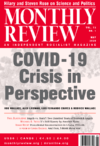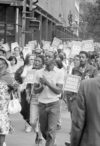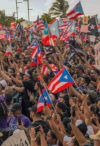Volume 72, Issue 01 (May 2020)

In its wider economic, ecological, epidemiological, and public health context, the current COVID-19 pandemic demonstrates the enormous dangers of the metabolic rift in human ecology and epidemiology brought on by capitalist social relations in the age of monopoly-finance capital, global agribusiness, and intricate, globe-spanning supply chains associated with the extreme exploitation and expropriation of both human beings and nature. Neoliberalism, representing the inner logic of capitalism, has left the world vulnerable to catastrophe wherever it has come into play. | more…

COVID-19, the illness caused by coronavirus SARS-CoV-2, the second severe acute respiratory syndrome virus since 2002, is now officially a pandemic. As of late March, whole cities are sheltered in place and, one by one, hospitals are lighting up in medical gridlock brought about by surges in patients. | more…

Hilary Rose, a sociologist, and Steven Rose, a neuroscientist, were two of the principal founders of the British Society for Social Responsibility in Science in the late 1960s in London. They speak about their work as scientists and antiwar activists, particularly around the issue of Palestinian liberation. | more…

At the bicentenary of his birth, Frederick Engels’s reputation as an original thinker is, among Anglophone academics at least, at its nadir. Despite the recent global economic crisis and associated increases in inequality that have tended to confirm Karl Marx and Engels’s general critique of capitalism, Marxism is an optimistic doctrine that has not fared well in a context dominated by working-class retreat and demoralization. But if this context has been unpropitious for Marxism generally, criticisms of Engels’s thought have a second, quite separate, source. Over the course of the twentieth century, a growing number of commentators have claimed that Engels fundamentally distorted Marx’s thought, and that “Marxism” and especially Stalinism emerged out of this one-sided caricature of Marx’s ideas. | more…

As the long history, right to the present day, of police and vigilante violence against black people has shown with great clarity, the racial chasm between black and white people in the United States lives on. A few black men and women have climbed into the 1 percent, and a sizable African-American middle class now exists. But by every measure of social well-being, black Americans fare much worse than their white counterparts. Just as for the economic, political, and social distance between capitalists and workers, so too is there a differential between black and white people, for these same interconnected components of daily life continue because of the way our system is structured. | more…

In 1952, the West African nation of Ghana, recently having freed itself from British imperialism, set out on a project of radical economic reconstruction unmatched anywhere on the continent in scope and ambition. Having attained political independence with the creation of a sovereign parliament and executive office, the Convention People’s Party under the leadership of Kwame Nkrumah drew up extensive plans for ensuring the conditions necessary for real, not just on-paper, independence. | more…

A new poem by Linda Backiel. | more…






